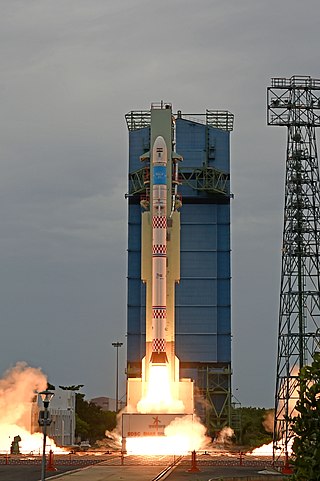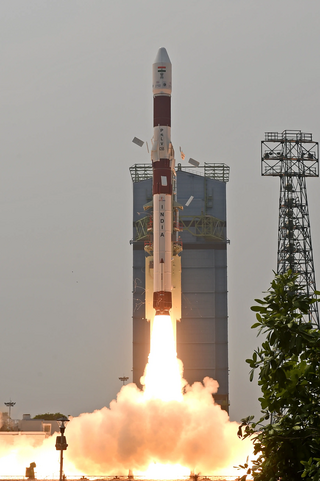
The Polar Satellite Launch Vehicle (PSLV) is an expendable medium-lift launch vehicle designed and operated by the Indian Space Research Organisation (ISRO). It was developed to allow India to launch its Indian Remote Sensing (IRS) satellites into Sun-synchronous orbits, a service that was, until the advent of the PSLV in 1993, only commercially available from Russia. PSLV can also launch small size satellites into Geostationary Transfer Orbit (GTO).

Geosynchronous Satellite Launch Vehicle (GSLV) is a class of expendable launch systems operated by the Indian Space Research Organisation (ISRO). GSLV has been used in fifteen launches since 2001.

Satish Dhawan Space Centre – SDSC is the primary spaceport of the Indian Space Research Organisation (ISRO), located in Sriharikota, Tirupati district, Andhra Pradesh.

RISAT (Radar Imaging Satellite) is a series of Indian radar imaging reconnaissance satellites built by the Indian Space Research Organization (ISRO). They provide all-weather surveillance using synthetic aperture radars (SAR).

EOS-04 or Earth Observation Satellite - 04 is an Indian Space Research Organisation Radar Imaging Satellite designed to provide high-quality images under all weather conditions for applications such as Agriculture, Forestry & Plantations, Soil Moisture & Hydrology and Flood mapping. It is a follow on to RISAT-1 satellite with similar configuration. The satellite is developed by the ISRO and it is the sixth in a series of RISAT satellites.
PSLV-C34 was the 36th mission of the PSLV program and 14th mission of PSLV in XL configuration. The PSLV-C34 successfully carried and deployed 20 satellites in the Sun-synchronous orbit. With a launch mass of 320,000 kilograms (710,000 lb) and payload mass of 1,288 kilograms (2,840 lb), the C34 set a new record of deploying the maximum number of satellites by Indian Space Research Organisation in a single mission. The PSLV-C34 carried One Cartosat-2 satellite, SathyabamaSat, Swayam & 17 other satellites from United States, Canada, Germany & Indonesia.

PSLV-C37 was the 39th mission of the Indian Polar Satellite Launch Vehicle (PSLV) program and its 16th mission in the XL configuration undertaken by the Indian Space Research Organisation (ISRO). Launched on 15 February 2017 from the Satish Dhawan Space Centre at Sriharikota, Andhra Pradesh, the rocket successfully carried and deployed a record number of 104 satellites in Sun-synchronous orbits in a single mission, breaking the earlier record of launching 37 satellites by a Russian Dnepr rocket on 19 June 2014. This record was held until the launch of the Transporter-1 mission by SpaceX on 24 January 2021 which launched 143 satellites.

IRNSS-1H was the eighth in the Indian Regional Navigational Satellite System (IRNSS) series of satellites, after IRNSS-1A, IRNSS-1B, IRNSS-1C, IRNSS-1D, IRNSS-1E, IRNSS-1F and IRNSS-1G. It was lost in the launch failure of PSLV-C39 on August 31, 2017.

The Small Satellite Launch Vehicle (SSLV) is a small-lift launch vehicle developed by the Indian Space Research Organisation (ISRO) to deliver 500 kg (1,100 lb) payload to low Earth orbit or 300 kg (660 lb) payload to Sun-synchronous orbit. The rocket supports multi-orbital drop-offs capability for small satellites.

PSLV-C42 was the 44th mission of the Indian Polar Satellite Launch Vehicle (PSLV) program and its 12th mission in the Core Alone (CA) configuration. PSLV-C42 successfully carried and deployed 2 Earth observation satellites in Sun-synchronous orbits at an altitude of 588 kilometres (365 mi). It was launched on 16 September 2018 by the Indian Space Research Organisation (ISRO) from the first launch pad of the Satish Dhawan Space Centre at Sriharikota, Andhra Pradesh. The two international satellites were launched as part of a commercial arrangement between Surrey Satellite Technology Limited (SSTL) and ISRO's commercial arm Antrix Corporation Limited, run under the auspices of the Indian Government's Department of Space.

The PSLV-C44 was the 46th mission of the Indian Polar Satellite Launch Vehicle (PSLV) program. It was the first flight of PSLV-DL, having 2 strap-on boosters and placed a primary payload Microsat-R and a secondary payload of Kalamsat V2 in Sun-synchronous orbits.

The PSLV-C45 is the 47th mission of the Indian Polar Satellite Launch Vehicle (PSLV) program. The Polar Satellite Launch Vehicle (PSLV)-C45 was launched on 1 April 2019 with a payload of 29 satellites, including one for electronic intelligence, along with 28 customer satellites from other countries.

The PSLV-C51 is the 53rd mission of the Indian Polar Satellite Launch Vehicle (PSLV) program. The Polar Satellite Launch Vehicle (PSLV)-C51 was launched at 04:54 (UTC) / 10:24 (IST) on 28 February 2021 with the main payload from Brazil, INPE's Amazônia-1 and 18 other ride-sharing small satellites.

The PSLV-C49 is the 51st mission of the Indian Polar Satellite Launch Vehicle (PSLV) and second flight in 'DL' configuration. The Polar Satellite Launch Vehicle (PSLV)-C49 was successfully launched from Second Launch Pad, Satish Dhawan Space Centre on November 7, 2020, at 9:41 (UTC) /15:11 (IST) carrying EOS-01 along with nine international customer satellites.

The PSLV-C54 was the 56th mission of the Indian Space Research Organisation's Polar Satellite Launch Vehicle (PSLV). It was launched on 26 November 2022 with the Oceansat-3 satellite and Thybolt nanosatellites of Dhruva Space from Satish Dhawan Space Centre, Sriharikota, Andhra Pradesh, India.

The PSLV-C55 was the 57th mission of Indian Space Research Organisation's Polar Satellite Launch Vehicle (PSLV) and the 16th flight of the PSLV-CA variant.

The PSLV-C56 was the 58th mission of Indian Space Research Organisation's Polar Satellite Launch Vehicle (PSLV) and the 17th flight of the PSLV-CA variant, and was launched from Satish Dhawan Space Centre First Launch Pad (FLP).

PSLV-C46 was a mission of the Indian Polar Satellite Launch Vehicle (PSLV) rocket, launched on Thursday, May 22, 2019, at 05:30 Hrs (IST) by the Indian Space Research Organisation (ISRO) from the first launch pad of the Satish Dhawan Space Centre at Sriharikota, Andhra Pradesh. In this mission, the 'Core-Alone' configuration of PSLV was flown.

















